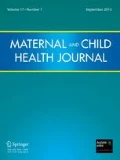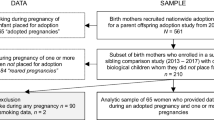Abstract
Objectives
To examine whether women whose partners are involved in their pregnancy are more likely to receive early prenatal care and reduce cigarette consumption over the course of the pregnancy. This study also examines sociodemographic predictors of father involvement during pregnancy.
Methods
Data on 5,404 women and their partners from the first wave of the Early Childhood Longitudinal Study-Birth Cohort (ECLS-B) were used to examine the association between father involvement during pregnancy and maternal behaviors during pregnancy. Multivariate linear and logistic regression analyses were used and data were weighted to account for the complex survey design of the ECLS-B.
Results
Women whose partners were involved in their pregnancy were 1.5 times more likely to receive prenatal care in the first trimester and, among those who smoked at conception, to reduce their cigarette consumption 36% more than women whose partners were not involved in the pregnancy (p = .09). Fathers with less than a high school education were significantly less likely to be involved in their partner’s pregnancy, while first-time fathers and fathers who reported wanting the pregnancy were significantly more likely to be involved.
Conclusions
The positive benefits of father involvement often reported in the literature on child health and development can be extended into the prenatal period. Father involvement is an important, but understudied, predictor of maternal behaviors during the prenatal period, and improving father involvement may have important consequences for the health of his partner, her pregnancy, and their child.
Similar content being viewed by others
References
Clinton, W. J. (1995). Supporting the role of fathers in families. Washington D.C.: Memorandum for the heads of executive departments and agencies.
Deutsch, F. M., Servis, L. J., & Payne, J. D. (2001). Paternal participation in child care and its effects on children’s self-esteem and attitudes toward gendered roles. Journal of Family Issues, 22, 1000–1024.
Cooksey, E. C., & Fondell, M. M. (1996). Spending time with his kids: Effects of family structure on fathers’ and children’s lives. Journal of Marriage and the Family, 58, 693–707.
Amato, P. R., & Rivera, F. (1999). Paternal involvement and children’s behavior problems. Journal of Marriage and the Family, 61, 375–384.
Fagan, J., & Iglesias, A. (1999). Father involvement program effects on fathers, father figures, and their Head Start children: A quasi-experimental study. Early Childhood Research Quarterly, 14, 243–269.
Nord, C. W., Brimhall, D., & West, J. (1997). Fathers’ involvement in their children’s schools. Washington D.C.: National Center for Education Statistics.
Tamis-LeMonda, C. S., Shannon, J. D., Cabrera, N. J., & Lamb, M. E. (2004). Fathers and mothers at play wtih their 2- and 3-year-olds: Contributions to language and cognitive development. Child Development, 75, 1806–1820.
Ray A., Hans S. (1996). Caregiving and providing: The effect of paternal involvement of urban low-income African American fathers on parental relations. In: The Demographic and Behavioral Sciences Branch and the Mental Retardation and Developmental Disabilities Branch of the National Institute of Child Health and Human Development tFIFoCa, ed. Conference on Developmental, Ethnographic, and Demographic Perspectives on Fatherhood. Bethesda, MD.
Rini, C., Schetter, C. D., Hobel, C. J., Glynn, L. M., & Sandman, C. A. (2006). Effective social support: Antecedents and consequences of partner support during pregnancy. Personal Relationships, 13, 207–229.
Cutrona, C. E. (1996). Social support as a determinant of marital quality: The interplay of negative and supportive behaviors. In: Pierce G. R, Sarason B. R, & Sarason IG (eds.), Handbook of social support and the family. New York: Plenum Press.
Kroelinger, C. D., & Oths, K. S. (2000). Partner support and pregnancy wantedness. Birth, 27, 112–119.
Hellerstedt, W. L., Pirie, P. L., & Lando, H. A. et al. (1998). Differences in preconceptional and prenatal behaviors in women with intended and unintended pregnancies. American Journal of Public Health, 88, 663–666.
Kost, K., Landry, D. J., & Darroch, J. E. (1998). Predicting maternal behaviors during pregnancy: Does intention status matter? Family Planning Perspectives, 30, 79–88.
Teitler, J. O. (2001) Father involvement, child health, and maternal health behavior. Children and Youth Services Review, 23, 403–425.
Yeung, W. J., Sandberg, J. F., Davis-Kean, P. E., & Hofferth, S. L. (2001). Children’s time with fathers in intact families. Journal of Marriage and the Family, 63, 136–154.
Coley, R. L., & Chase-Lansdale, P. L. (1999). Stability and change in paternal involvement among urban African American fathers. Journal of Family Psychology, 13, 416–435.
Ekeus, C., & Christensson, K. (2003). Reproductive history and involvement in pregnancy and childbirth of fathers of babies born to teenage mothers in Stockholm, Sweden. Midwifery, 19, 87–95.
Sangi-Haghpeykar, H., Mehta, M., Posner, S., & Poindexter, A. R. (2005) Paternal influences on the timing of prenatal care among Hispanics. Maternal Child Health Journal, 9, 159–163.
National Center for Education Statistics. (2004). User’s manual for the ECLS-B nine-month restricted-use data file and electronic code book. Washington, DC.
Bronte-Tinkew J., Carrano J., Guzman L. (2006). Fathers’ perceptions of their roles, socio-demographic correlates and links to involvement with infants. Fathering: A Journal of Theory, Research and Practice about Men as Fathers, 4(3), 254–285.
Sable, M. R. (1999). Pregnancy intentions may not be a useful measure for research on maternal and child health outcomes. Family Planning Perspectives, 31, 249–250.
US Census Bureau. (2002). Fertility of American women current population survey—June 2002 detailed tables. Census Bureau Population Division Fertility & Family Statistics Branch.
Acknowledgments
This research was supported in part by a grant from the National Institute for Child Health and Human Development (R01 HD046123–01) to Dr. Elizabeth C. Hair, Ph.D and Dr. Tamara Halle, Ph.D.
Author information
Authors and Affiliations
Corresponding author
Rights and permissions
About this article
Cite this article
Martin, L.T., McNamara, M.J., Milot, A.S. et al. The Effects of Father Involvement during Pregnancy on Receipt of Prenatal Care and Maternal Smoking. Matern Child Health J 11, 595–602 (2007). https://doi.org/10.1007/s10995-007-0209-0
Received:
Accepted:
Published:
Issue Date:
DOI: https://doi.org/10.1007/s10995-007-0209-0



